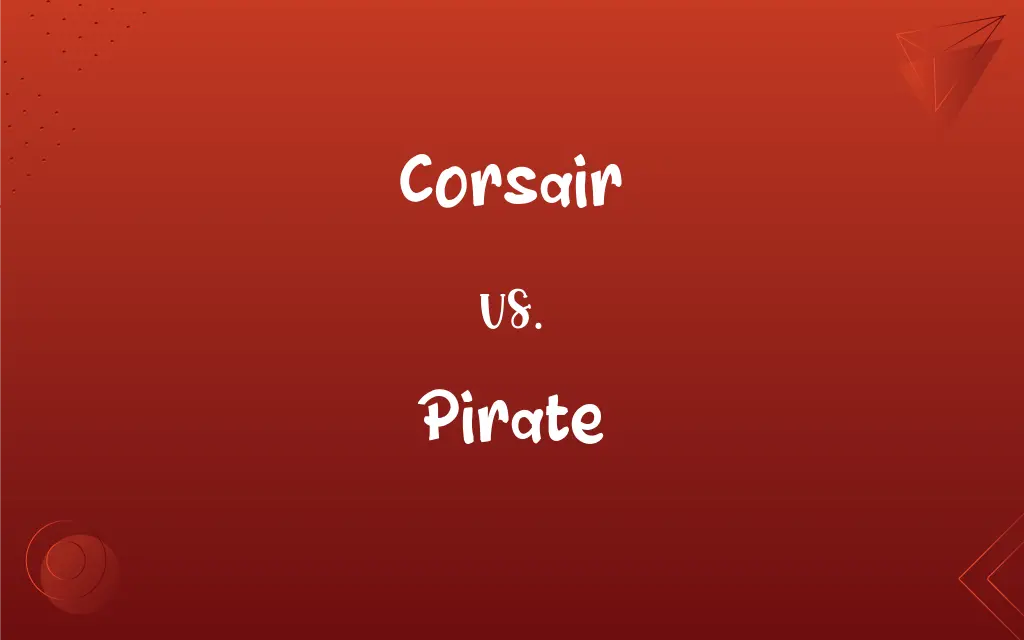Corsair vs. Pirate: What's the Difference?
By Janet White || Updated on May 23, 2024
A corsair was a privateer operating with a government’s authorization, often in the Mediterranean, while a pirate is an outlaw who engages in robbery at sea without legal sanction.

Key Differences
A corsair was a type of privateer or pirate, particularly active in the Mediterranean Sea, authorized by a government to attack enemy ships. Corsairs, such as the Barbary corsairs, had legal backing from their respective states, making their activities a form of legalized piracy. This distinction allowed them to operate within a framework of legality, often targeting ships from rival nations. Pirates, in contrast, operated without any legal sanction, attacking ships from any nation purely for personal gain. Pirates are seen as outlaws, engaging in maritime robbery and other crimes on the high seas without any authorization. Their activities are universally considered illegal, and they are often pursued and punished by various governments.
While corsairs had a semblance of legitimacy due to their government-issued letters of marque, pirates were seen as lawless and criminal. Corsairs could return to their home ports and be welcomed as heroes or legitimate warriors, whereas pirates were hunted and faced severe penalties if captured.
The term corsair is often associated with historical conflicts, such as those involving the Barbary States or the French during the 17th and 18th centuries. Pirates, however, have existed throughout history in various forms and locations, from the Caribbean to the South China Sea.
Both corsairs and pirates engaged in similar activities, such as looting and attacking ships, but the key difference lies in their legal status and the perception of their actions. Corsairs operated under the guise of legality, while pirates were universally condemned as criminals.
Comparison Chart
Definition
Privateer with government authorization
Outlaw who engages in maritime robbery
ADVERTISEMENT
Legal Status
Legally sanctioned
Illegal and criminal
Operating Regions
Mainly the Mediterranean
Worldwide
Perception
Often seen as legitimate warriors
Seen as outlaws and criminals
Historical Examples
Barbary corsairs, French corsairs
Caribbean pirates, South China Sea pirates
Corsair and Pirate Definitions
Corsair
A legalized pirate who held letters of marque.
The corsair's actions were backed by his home country, legitimizing his plunder.
ADVERTISEMENT
Pirate
An outlaw who robs ships at sea without legal sanction.
The pirate crew attacked the merchant vessel, looting its valuable cargo.
Corsair
A maritime raider endorsed by a state.
The corsair returned to port as a celebrated hero.
Pirate
A sea robber operating outside the law.
The pirate captain was captured and executed for his crimes.
Corsair
A naval mercenary engaging in piracy under a sovereign's sanction.
French corsairs harried British shipping during the 18th century.
Pirate
A maritime bandit who attacks ships for personal gain.
Pirates often hid their treasure on remote islands.
Corsair
A pirate operating in the Mediterranean with governmental approval.
Barbary corsairs were notorious for their raids along the European coast.
Pirate
One who commits or practices piracy at sea.
Corsair
A pirate or privateer, especially along the Barbary Coast.
Pirate
One who makes use of or reproduces the work of another without authorization.
Corsair
A swift pirate ship, often operating with official sanction.
Pirate
One who illegally intercepts or uses radio or television signals, especially one who operates an illegal television or radio station.
Corsair
A French privateer, especially from the port of Saint-Malo.
Pirate
To attack and rob (a ship at sea).
Corsair
A privateer or pirate in general.
Pirate
To take (something) by piracy.
Corsair
The ship of privateers or pirates, especially of French nationality.
Pirate
To make use of or reproduce (another's work) without authorization.
Corsair
A nocturnal assassin bug of the genus Rasahus, found in the southern USA.
Pirate
To act as a pirate; practice piracy.
Corsair
A Californian market fish (Sebastes rosaceus).
Pirate
A criminal who plunders at sea; commonly attacking merchant vessels, though often pillaging port towns.
You should be cautious due to the Somali pirates.
Corsair
A pirate; one who cruises about without authorization from any government, to seize booty on sea or land.
Pirate
An armed ship or vessel that sails for the purpose of plundering other vessels.
Corsair
A piratical vessel.
Barbary corsairs . . . infested the coast of the Mediterranean.
Pirate
(by extension) One who breaks intellectual property laws by reproducing protected works without permission.
Corsair
A Californian market fish (Sebastichthys rosaceus).
Pirate
(ornithology) A bird which practises kleptoparasitism.
Corsair
A pirate along the Barbary coast
Pirate
A kind of marble in children's games.
Corsair
A swift pirate ship (often operating with official sanction)
Pirate
(transitive) To appropriate by piracy; to plunder at sea.
They pirated the tanker and sailed to a port where they could sell the ship and cargo.
Corsair
A privateer authorized to attack enemy ships.
The corsair sailed under the flag of the Ottoman Empire, targeting European vessels.
Pirate
To create and/or sell an unauthorized copy of.
Pirate
To knowingly obtain an unauthorized copy of.
Not willing to pay full price for the computer game, Heidi pirated a copy.
Pirate
(intransitive) To engage in piracy.
He pirated in the Atlantic for years before becoming a privateer for the Queen.
Pirate
To entice an employee to switch from a competing company to one's own.
Pirate
Illegally imitated or reproduced, said of a trademarked product or copyrighted work, or of the counterfeit itself.
Pirate
A robber on the high seas; one who by open violence takes the property of another on the high seas; especially, one who makes it his business to cruise for robbery or plunder; a freebooter on the seas; also, one who steals in a harbor.
Pirate
An armed ship or vessel which sails without a legal commission, for the purpose of plundering other vessels on the high seas.
Pirate
One who infringes the law of copyright, or publishes the work of an author without permission.
Pirate
To play the pirate; to practice robbery on the high seas.
Pirate
To publish, as books or writings, without the permission of the author.
They advertised they would pirate his edition.
Pirate
Someone who uses another person's words or ideas as if they were his own
Pirate
Someone who robs at sea or plunders the land from the sea without having a commission from any sovereign nation
Pirate
A ship manned by pirates
Pirate
Copy illegally; of published material
Pirate
Take arbitrarily or by force;
The Cubans commandeered the plane and flew it to Miami
Pirate
A criminal engaged in maritime robbery.
Pirates of the Caribbean were infamous for their brutal tactics.
Pirate
An individual who engages in unauthorized seafaring plunder.
The pirate flag, or Jolly Roger, struck fear into the hearts of sailors.
FAQs
Where did corsairs primarily operate?
Corsairs primarily operated in the Mediterranean Sea.
What is a corsair?
A corsair is a privateer authorized by a government to attack enemy ships.
Were pirates found only in the Caribbean?
No, pirates operated worldwide, including the Caribbean, the South China Sea, and other regions.
How does a pirate differ from a corsair?
A pirate operates without legal sanction, while a corsair is authorized by a government.
Did pirates have any legal backing?
No, pirates operated outside the law and had no legal backing.
Did corsairs have letters of marque?
Yes, corsairs operated under letters of marque issued by their governments.
Could corsairs return to their home ports safely?
Yes, corsairs were often welcomed as heroes or legitimate warriors in their home ports.
Were corsairs considered legal?
Yes, corsairs were legally sanctioned by their governments.
Were pirates universally condemned?
Yes, pirates were universally condemned and pursued by various governments.
Were pirates considered criminals by all nations?
Yes, pirates were considered criminals by all nations.
What was the main goal of pirates?
The main goal of pirates was personal gain through maritime robbery.
Did pirates face severe penalties if captured?
Yes, pirates faced severe penalties, including execution, if captured.
How did governments view corsairs?
Governments that authorized corsairs viewed them as legitimate privateers.
How did corsairs benefit their sponsoring states?
Corsairs weakened enemy trade and military capabilities, benefiting their sponsoring states through maritime disruption.
What were Barbary corsairs?
Barbary corsairs were pirates from North Africa authorized by their governments to attack European ships.
Were corsairs and pirates ever the same individuals?
Sometimes, individuals could act as corsairs under legal sanction and as pirates without it, depending on circumstances.
Were corsairs seen as heroes?
In their home countries, corsairs could be seen as heroes or legitimate combatants.
What kind of ships did corsairs target?
Corsairs targeted enemy ships as specified by their government authorization.
Did corsairs operate during specific historical periods?
Yes, corsairs were notably active during conflicts like those involving the Barbary States and European powers in the 17th and 18th centuries.
Did corsairs engage in similar activities as pirates?
Yes, corsairs engaged in similar activities like looting and attacking ships, but with legal authorization.
About Author
Written by
Janet WhiteJanet White has been an esteemed writer and blogger for Difference Wiki. Holding a Master's degree in Science and Medical Journalism from the prestigious Boston University, she has consistently demonstrated her expertise and passion for her field. When she's not immersed in her work, Janet relishes her time exercising, delving into a good book, and cherishing moments with friends and family.































































